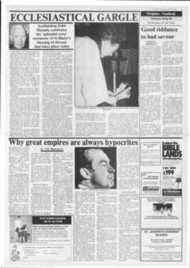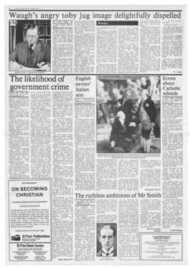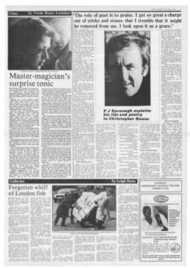Page 6, 3rd February 1984
Page 6

Report an error
Noticed an error on this page?If you've noticed an error in this article please click here to report it.
Tags
Share
Related articles
Bishops' View Of The Bomb 'election Issue'
Christian Books Against The Bomb
Vatican Supports Scots Over Trident
Us Congressmen Criticise Bishops
The Mushroom Cloud That Hangs Over The Nuclear Dilemma
The likelihood of government crime
Catholics and Nuclear War, Philip Nurnion (ed.), (Geoffrey Chapman, 346pp, £9.95).
FOR ANY Christian looking for guidance on the bomb, the American bishops' pastoral letter, The Challenge of Peace, is required reading. Catholics and Nuclear War is published as a commentary on it.
It is unfortunately not a commentary so much as a collection of short and diverse essays by American authors, some for, some against, others having •no direct reference to the letter at all.
They are followed by the complete text of the letter. Three or four excellent contributions make it a worthwhile book however, especially those by William Murnion, Sandra Schneiders, Bruce Russet and Richard McCormick.
Between them they make it very clear what the real strengths of the letter are.
First and foremost is the bishops' "No to nuclear war." This means something quite definite: to make it easier for public opinion to "resist resort to nuclear war as an instrument of national policy".
They have faced something which other episcopal conferences have so far been unable to face: the evolution of nuclear policy away from simple deterrence by threat of destroying cities in a war of mutual destruction — deeply immoral as that was — to something quite different.
That is, deterrence by threat to destroy the enemy's forces. This "counterforce" policy is a more credible threat but it lends itself to plans for "prevailing" and even "winning" a "protracted nuclear war".
If, as most experts believe, a counterforce nuclear war would destroy everything else as well, we are now in a much more dangerous situation than before and an equally Immoral one.
Whereas a war of mutual destruction needs relatively few weapons to keep upthe threat, the later policy encourages a virtually unlimited number, since almost anything can become a military target.
There are 40,000 identified nuclear targets for United States weapons in the Soviet Union, as the bishops discovered, including 60 in Moscow alone. Most are in or near to cities.
Also there will soon be a grievous temptation in times of great crisis for the side which believes its forces to be vulnerable to attack to strike first before it loses its weapons.
But there is no plausible use of nuclear weapons, even against strictly military goals, which would not also kill and maim millions. This leads the bishops to say that "We do not perceive any situation in which the deliberate initiation of nuclear warfare on however restricted a scale can be morally justified".
This represents a historic abandonment of the "moral" alternative to a war of mutual destruction, namely deterrence based on the threat of limited nuclear war against non-civilian targets. It was much canvassed by influential Catholic moralists in the past, such as John Courtney Murray, and still belatedly supported by James Finn in the volume under review.
As the bishops say, "It would be a perverted political and moral casuistry which tried to justify using a weapon which 'indirectly' or 'unintentionally' killed a million people because they happened to live near a "militarily significant target".
So they reject the Nato "first use" policy and anything which would make resort to nuclear weapons easier. It would be "an unjustified moral risk". These include the just war criteria and the inseparable connection between intentions and acts.
For this means that — since there is always a possibility that the weapons meant for deterrence may one day be used to kill — it is relevant to the morality of deterrence to ask what would be done if it were to break down and the weapons fired at their targets.
So the Vatican guidelines oblige one to distinguish between deterrence practices which are morally acceptable and those which are not: "specifically" say the bishops, "it is not morally acceptable to intend to kill the innocent as part of a strategy of deterring nuclear war".
So with these severe conditions, the Papal statement cannot amount to a simple endorsement of deterrence as the lesser of two evils.
It is not possible to divorce the morality of possession from the morality of use, as several authors in this book realise.
So the American bishops, developing the Vatican line of thinking, have rejected that utilitarian casuistry — favoured by some Catholic moralists in this country such as Gerard Hughes — which tries to separate intentions to deter from intentions to use, as if they are two quite separate moral situations.
Although the bishops cannot bring themselves to condemn deterrence outright, they commend those who do and they resist all temptations to come up with a moral theory which would justify it in some pure, acceptable form.
Nuclear deterrence .is after all, a manifestation of radical moral disorder. Sandra Schnieders spells out just how in her New Testament reflections.
It is unacceptable as a permanent policy. Whether we are right or wrong about it depends on the direction in which we are going: into it or out of it.
The direction in which governments are going is the opposite to the one in which the Pope and the bishops require them to go if deterrence is to be tolerated as a temporary state.
In fact the American bishops show a deep scepticism about any form of it. I agree with William Murnion that "it is indeed hard to see how any positive acceptance of deterrence, in principles or in policy, survives these reservations."
There are weaknesses in the pastoral letter, such as the lack of clarity about how pacifism and just war doctrine can be "complementary", and also the lack of any real connection between the biblical section with which it begins and the moral arguments which follow.
This is the substance of Sandra Schneiders's criticism. But there are many other things, too numerous to mention here, which we have to thank the American bishops for. They have made it a little less likely that governments will commit the crimes which they are preparing for. Catholics and Nuclear War, uneven though it is, is worth having for the help it gives in understanding the real implications of the pastoral letter.
Roger Ruston OP
blog comments powered by Disqus












